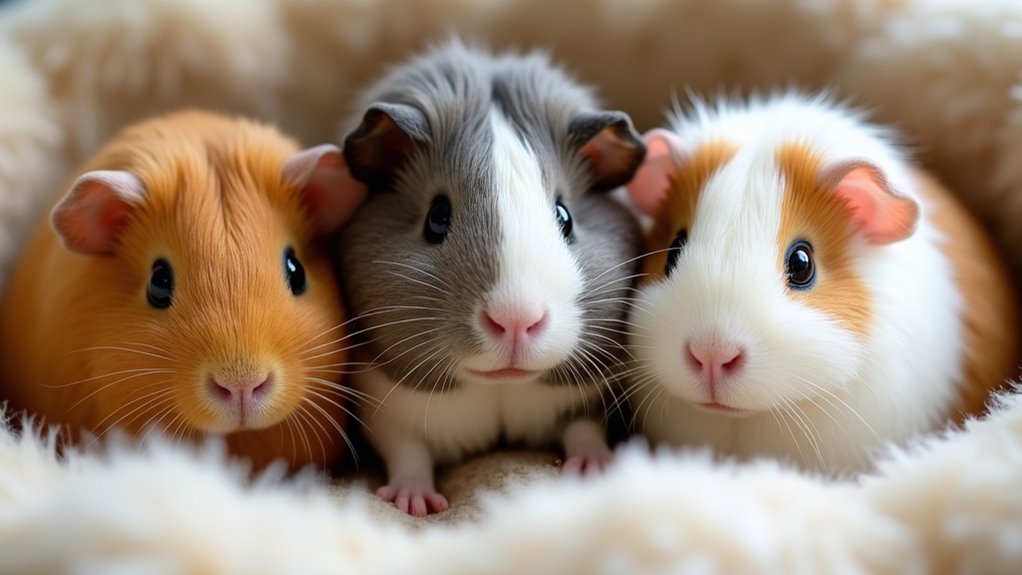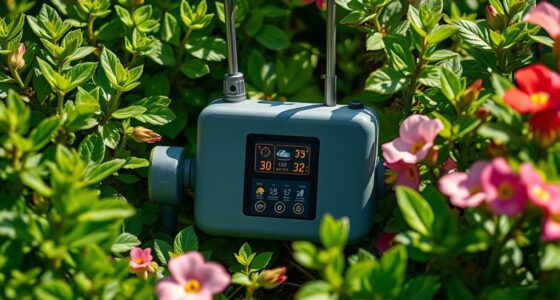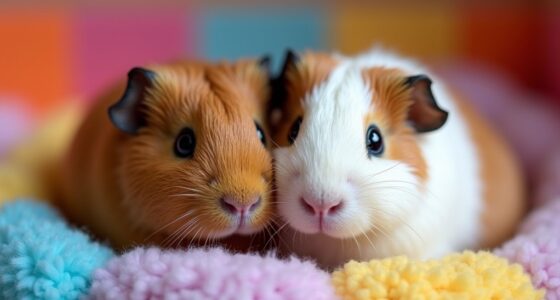When choosing a guinea pig, pick a breed that fits your lifestyle, such as short-haired for easier grooming or long-haired for a showy look. Look for a healthy pet with bright eyes, a shiny coat, and alert behavior. Check its teeth and overall activity level to guarantee good health. Reputable breeders or shelters provide better chances of finding a vibrant, well-cared-for animal. Keep exploring to learn how to spot the perfect healthy companion for you.
Key Takeaways
- Select breeds suited to your grooming and space preferences, such as short-haired for low maintenance or long-haired for grooming enthusiasts.
- Check for signs of good health, including bright eyes, clean ears, shiny coat, and active behavior.
- Consider temperament and social needs to ensure compatibility with your household and other pets.
- Choose reputable breeders or shelters that provide health history and proper care information.
- Ensure the guinea pig is alert, responsive, and free from overgrown teeth or signs of illness before bringing it home.

Choosing a guinea pig is an exciting decision that requires careful contemplation. When you’re selecting your new pet, it’s essential to think about their specific needs to ensure a happy, healthy life together. One of the first things to consider is their diet. Guinea pigs have unique dietary needs; they require a diet rich in fresh hay, supplemented with high-quality pellets and plenty of fresh vegetables. Avoid foods that are toxic to them, like iceberg lettuce or sugary treats. Feeding your guinea pig a balanced diet helps prevent health problems and keeps their coat shiny and their teeth properly worn down. It’s also important to provide vitamin C-rich foods because guinea pigs can’t produce their own. Including bell peppers, leafy greens like kale, and vitamin C supplements can make a big difference in their overall health.
Alongside diet considerations, grooming tips play a significant role in keeping your guinea pig comfortable and clean. Depending on the breed you choose, grooming needs can vary. For short-haired breeds, regular brushing helps remove loose fur and prevents matting, especially during shedding seasons. Long-haired breeds like Peruvians or Silky guinea pigs require more frequent grooming and trimming to keep their coats manageable and free of tangles. Always use a gentle brush designed for small animals, and be patient during grooming sessions to minimize stress. Regular grooming not only keeps their appearance tidy but also allows you to check their skin for signs of parasites or skin conditions, ensuring early intervention if needed. Additionally, proper enclosure setup can help maintain a clean environment and keep your guinea pig healthy. Providing a spacious, clean cage with bedding that absorbs moisture can also prevent skin issues and promote comfort.
When selecting a guinea pig, look for signs of good health: clear, bright eyes, clean ears, and a shiny coat. Check their teeth—overgrown teeth can cause eating difficulties—and ensure they are active and alert. Reputable breeders or shelters will often have detailed information about the pet’s background, which can help you make a more informed choice. It’s also wise to observe their interactions with other guinea pigs if possible, as social animals thrive in compatible groups. Additionally, understanding the social needs of guinea pigs can help ensure they are happy and well-adjusted in their new environment.
In the end, choosing the right guinea pig means considering their dietary needs, grooming requirements, and overall health. With proper care and attention, your new pet will become a delightful companion, bringing joy and companionship into your life. Remember, investing time upfront in understanding their needs will pay off with a happy, healthy guinea pig that thrives under your care.
Frequently Asked Questions
How Long Do Guinea Pig Breeds Typically Live?
Guinea pig breeds typically live 4 to 8 years, but proper care can extend their lifespan. You should consider their diet, providing fresh hay, vegetables, and vitamin C supplements, along with grooming requirements like regular brushing to keep their coat healthy. Meeting these needs helps prevent health issues and ensures your pet stays happy and active, no matter the breed you choose. Proper care directly influences how long your guinea pig will live.
Are Certain Breeds More Prone to Health Issues?
Some guinea pig breeds are more prone to health issues due to breed susceptibility and genetic health issues. For example, skinny pigs and Abyssinians often face skin and dental problems, while long-haired breeds like Peruvians may develop matting and parasitic infections. You should research each breed’s common health concerns and select a reputable breeder who tests for genetic health issues, helping guarantee your pet’s long-term well-being.
What Is the Best Age to Adopt a Guinea Pig?
Oh, the perfect age to adopt a guinea pig? Well, you’d think it’s as simple as finding a cute baby, but juvenile behavior can be quite the handful. Ideally, you should adopt a young adult, around 4-6 months old, when they’re more settled. This age helps avoid breeding considerations and guarantees you get a guinea pig with a balanced temperament, ready to be your adorable, less mischievous companion.
Can Different Guinea Pig Breeds Successfully Coexist?
You can often have different guinea pig breeds successfully coexist, but breed compatibility depends heavily on their social behavior. Some breeds are more sociable and tolerant, making them easier to pair, while others may be more territorial. To guarantee harmony, introduce new guinea pigs carefully and monitor their interactions. Keep in mind that individual personalities matter more than breed alone, so observe their behavior and provide a spacious, comfortable environment.
How Do I Identify Signs of a Healthy Guinea Pig?
To identify a healthy guinea pig, watch for bright, clear eyes and a clean coat. They should have steady, normal breathing and be active during playtime. Check their dietary habits—healthy guinea pigs eat hay, fresh vegetables, and pellets regularly. Their grooming routines should be simple, with minimal hair loss or skin issues. Avoid signs of lethargy, discharge, or overgrown teeth, which indicate health concerns needing vet attention.
Conclusion
Choosing the right guinea pig is like finding a loyal friend who brightens your day. By selecting a healthy, friendly breed and paying attention to their needs, you set the stage for a joyful companionship. Remember, your new pet is a tiny adventure waiting to unfold—treat it with love and care, and you’ll both enjoy a bond that’s as warm as sunshine. Your perfect guinea pig is just a decision away—ready to become part of your story.









